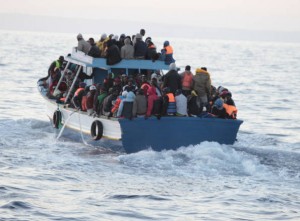By Libya Herald reporters.

Tripoli, 9 October 2015:
As widely expected, the UN Security Council has this evening empowered the EU to crack . . .[restrict]down on people smugglers operating out of Libya.
However the resolution, which was backed by both Russia and China but from which Venezuela alone abstained, said that besides EU naval forces, “individual countries” would be able to “inspect and/or seize vessels suspected of people smuggling in the Mediterranean”.
It is unclear if this opens the door for other states, including the US to join in the anti-smuggler campaign.
The Security Council majored on the still growing toll of deaths among migrants launched by Libya people smugglers, which it referred to as being in the “hundreds” when in August the International Organization for Migration reported that migrant drownings had passed 2,000 mark.
The UNSC resolution appears to carry safeguards. The interception of vessels suspected of being used for migrant smuggling or human trafficking from Libya will only be allowed provided “good faith efforts” have been made to obtain the consent of the craft’s flag state. Given that most of the vessels deployed by smugglers, often with migrants captaining them, are either derelict fishing boats or inflatables, the chances of them flying any sort of flag seems remote. The only ships likely to be carrying any national flag are those that may be bringing fresh supplies of inflatable craft to Libyan smugglers.
A gloss of the resolution provided this evening by the UN itself says that patrolling naval forces would not be able to intercept “vessels entitled to sovereign immunity under international law” and would be confined to migrant smugglers on the “high seas off the coast of Libya”. This leaves open whether or not anti-smuggling forces would be able to operate within Libyan national waters. It has seemed clear that some of the recent rescues of migrants in sinking craft have been undertaken within Libyan waters.
While still protesting the inviolability of Libya’s 12-mile offshore limit, the House of Representatives on Thursday appeared to line itself up behind what was then the draft UNSC resolution.
Libya is still subject to an international arms embargo. The UNSC resolution makes no reference to this. However with EU naval forces and possibly others active off the Libyan coast, it must be wondered if there might not also be a move to interdict the maritime supply of weaponry as well as clamping down on the people smugglers. [/restrict]






